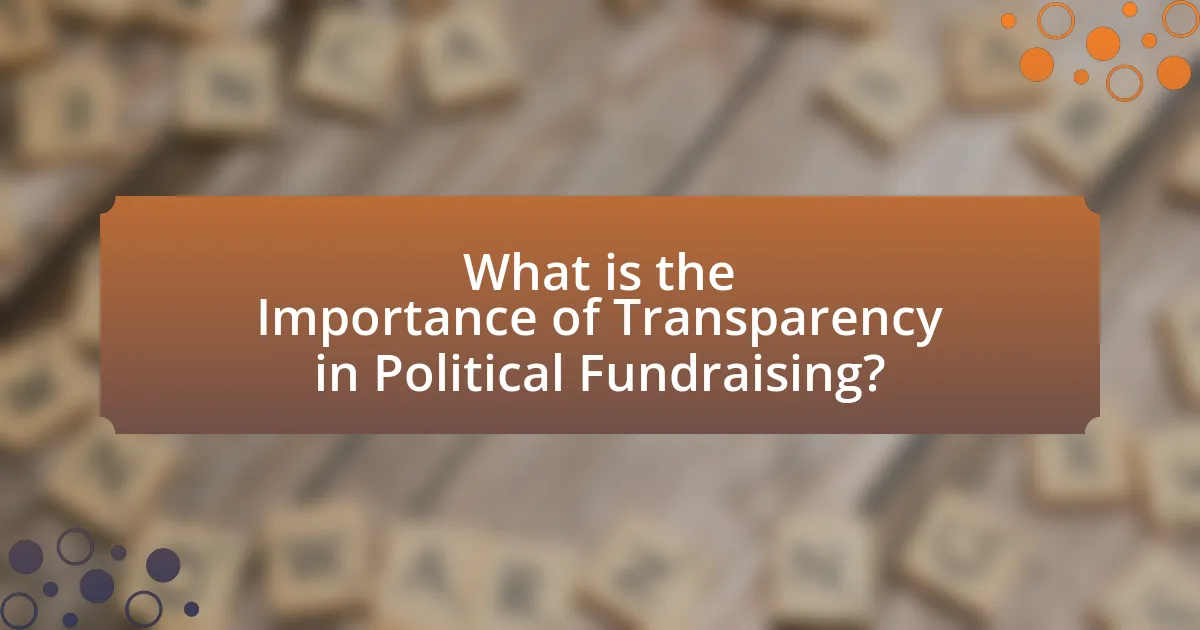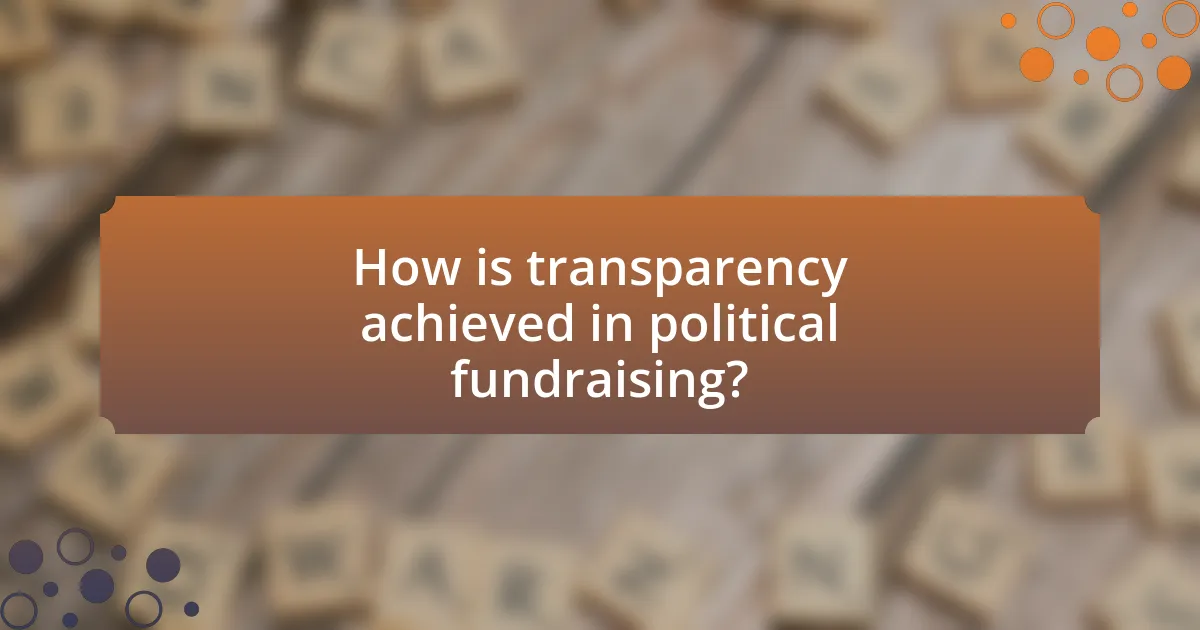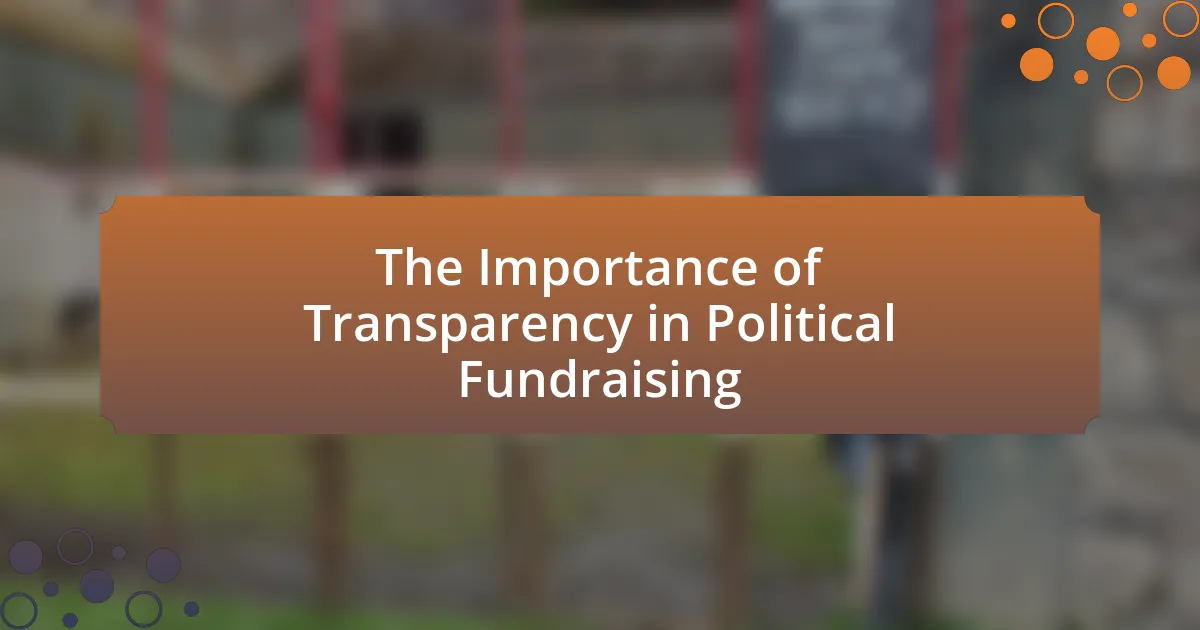The article focuses on the importance of transparency in political fundraising, highlighting its role in fostering trust between candidates and voters. It discusses how transparency promotes accountability, reduces corruption, and enhances voter engagement by allowing the public to scrutinize funding sources. The article also examines the consequences of a lack of transparency, the impact on public trust, and the regulatory frameworks that support transparent practices. Additionally, it outlines best practices for ensuring transparency, the challenges organizations face, and the positive outcomes associated with increased openness in political financing.

What is the Importance of Transparency in Political Fundraising?
Transparency in political fundraising is crucial as it fosters trust between candidates and voters. When donors and funding sources are disclosed, it allows the public to scrutinize potential influences on political decisions, thereby promoting accountability. For instance, the Federal Election Commission mandates that candidates report contributions, which helps to prevent corruption and ensures that voters are informed about who is financially supporting their representatives. Studies have shown that transparency can lead to increased voter engagement and confidence in the electoral process, as citizens feel more empowered to make informed choices based on the financial backing of candidates.
Why is transparency crucial in political fundraising?
Transparency is crucial in political fundraising because it fosters trust between candidates and their constituents. When voters can see where campaign funds originate and how they are spent, it reduces the likelihood of corruption and increases accountability. For instance, research by the Brennan Center for Justice indicates that transparency in campaign finance can lead to greater public confidence in electoral processes, as voters are more likely to support candidates who demonstrate ethical fundraising practices. This trust is essential for a healthy democracy, as it encourages civic engagement and informed voting.
What are the potential consequences of a lack of transparency?
A lack of transparency in political fundraising can lead to significant consequences, including diminished public trust, increased corruption, and the potential for illegal activities. When voters perceive that financial contributions are hidden or undisclosed, they may lose faith in the electoral process, believing that decisions are influenced by undisclosed interests rather than the public good. Research by the Brennan Center for Justice indicates that transparency in campaign financing is crucial for maintaining democratic integrity, as it helps to deter corruption and ensures accountability. Furthermore, without transparency, there is a higher risk of illegal contributions, such as foreign donations, which can undermine national security and electoral fairness.
How does transparency influence public trust in political candidates?
Transparency significantly enhances public trust in political candidates by providing clear and accessible information about their actions, decisions, and funding sources. When candidates openly disclose their financial contributions and expenditures, voters can better assess their integrity and motivations. Research indicates that candidates who practice transparency are perceived as more trustworthy; for instance, a study by the Pew Research Center found that 70% of voters believe transparency in campaign financing is crucial for evaluating candidates. This level of openness reduces skepticism and fosters a sense of accountability, ultimately leading to increased voter confidence and engagement in the political process.
What role does transparency play in the democratic process?
Transparency is essential in the democratic process as it fosters accountability and trust between the government and its citizens. When political actions, decisions, and fundraising activities are transparent, voters can make informed choices, ensuring that elected officials are held responsible for their actions. For instance, the Federal Election Commission mandates that candidates disclose their campaign contributions, which allows the public to scrutinize the sources of funding and potential influences on political decisions. This level of openness helps to mitigate corruption and promotes a more equitable political landscape, ultimately strengthening democracy.
How does transparency affect voter engagement and participation?
Transparency significantly enhances voter engagement and participation by fostering trust in the electoral process. When voters perceive that political fundraising and campaign financing are conducted openly, they are more likely to feel confident that their voices matter and that their votes will count. Research indicates that transparency in political financing can lead to increased voter turnout; for instance, a study by the Brennan Center for Justice found that states with more transparent campaign finance laws experienced higher voter participation rates. This correlation suggests that when voters are informed about where campaign funds come from and how they are spent, they are more motivated to engage in the electoral process.
What are the implications of transparency for campaign finance laws?
Transparency in campaign finance laws enhances accountability and public trust in the electoral process. By requiring detailed disclosure of contributions and expenditures, transparency allows voters to understand the financial influences behind candidates and political parties. For instance, the Federal Election Commission mandates that candidates report contributions over a certain threshold, which helps to identify potential conflicts of interest and undue influence from special interest groups. This level of scrutiny can deter corruption and promote fair competition among candidates, as evidenced by studies showing that increased transparency correlates with lower levels of perceived corruption in political systems.

How is transparency achieved in political fundraising?
Transparency in political fundraising is achieved through comprehensive disclosure requirements that mandate the reporting of contributions and expenditures. Regulatory frameworks, such as the Federal Election Commission (FEC) in the United States, require candidates and political committees to publicly disclose the sources and amounts of donations, ensuring that the public can access this information. For instance, the FEC’s regulations stipulate that contributions over a certain threshold must be reported, which helps to deter corruption and promotes accountability in the political process. Additionally, organizations like the Center for Responsive Politics provide tools for tracking campaign finance data, further enhancing transparency by making it accessible to voters and watchdog groups.
What are the best practices for ensuring transparency?
The best practices for ensuring transparency in political fundraising include clear disclosure of funding sources, regular reporting of financial activities, and open communication with stakeholders. Clear disclosure mandates that organizations publicly share the identities of donors and the amounts contributed, which helps build trust and accountability. Regular reporting involves providing timely updates on how funds are raised and spent, often through accessible financial statements or reports, which allows for scrutiny and oversight. Open communication encourages dialogue with the public and stakeholders about fundraising practices and financial decisions, fostering an environment of trust. These practices are supported by regulations such as the Federal Election Commission’s requirements for campaign finance disclosures, which aim to promote transparency and prevent corruption in political fundraising.
How can political campaigns effectively disclose their funding sources?
Political campaigns can effectively disclose their funding sources by implementing comprehensive reporting practices that adhere to legal requirements and promote transparency. This includes regularly filing detailed financial reports with election authorities, which outline contributions from individuals, organizations, and political action committees. For instance, the Federal Election Commission mandates that campaigns disclose contributions exceeding $200, ensuring that significant funding sources are publicly accessible. Additionally, campaigns can enhance transparency by utilizing online platforms to publish real-time updates on their funding, allowing voters to easily track where financial support originates. This approach not only complies with regulations but also builds trust with constituents, as evidenced by studies showing that transparency in campaign financing can positively influence voter perceptions and engagement.
What tools and technologies can enhance transparency in fundraising?
Blockchain technology enhances transparency in fundraising by providing a decentralized and immutable ledger for transactions. This technology allows donors to track their contributions in real-time, ensuring that funds are used as intended. For instance, platforms like BitGive utilize blockchain to facilitate transparent donations, allowing donors to see how their funds are allocated and spent. Additionally, data analytics tools can analyze fundraising data, providing insights into donor behavior and campaign effectiveness, which further promotes accountability. These technologies collectively foster trust and integrity in the fundraising process.
What challenges do organizations face in maintaining transparency?
Organizations face several challenges in maintaining transparency, particularly in political fundraising. One significant challenge is the complexity of regulatory compliance, as organizations must navigate a myriad of laws and regulations that vary by jurisdiction, which can lead to unintentional violations. Additionally, the lack of standardized reporting practices can result in inconsistent disclosures, making it difficult for stakeholders to assess the true financial activities of organizations. Furthermore, organizations often encounter resistance from internal stakeholders who may prioritize confidentiality over transparency, complicating efforts to provide clear and open communication. These challenges are compounded by the potential for public scrutiny and backlash, which can deter organizations from fully disclosing their fundraising activities.
How do regulatory frameworks impact transparency efforts?
Regulatory frameworks significantly enhance transparency efforts by establishing clear guidelines and requirements for disclosure in political fundraising. These frameworks mandate that organizations and individuals involved in fundraising activities report their financial contributions, expenditures, and affiliations, thereby creating a structured environment for accountability. For instance, the Federal Election Commission in the United States requires candidates and political committees to file regular financial reports, which are publicly accessible, allowing voters to scrutinize funding sources and potential conflicts of interest. This level of mandated transparency helps to deter corruption and fosters public trust in the political process, as evidenced by studies indicating that increased transparency correlates with higher voter confidence in electoral integrity.
What are common pitfalls that lead to a lack of transparency?
Common pitfalls that lead to a lack of transparency in political fundraising include inadequate disclosure of funding sources, complex financial structures, and insufficient regulatory oversight. Inadequate disclosure occurs when organizations fail to fully report contributions, making it difficult for the public to understand who is financing campaigns. Complex financial structures, such as the use of shell companies or dark money groups, obscure the true origins of funds, further complicating transparency. Insufficient regulatory oversight allows these practices to persist without accountability, as seen in various studies indicating that lax enforcement of campaign finance laws contributes to a culture of opacity in political funding.

What are the benefits of transparency in political fundraising?
Transparency in political fundraising enhances accountability and trust among constituents. When donors and funding sources are disclosed, voters can better understand the influences behind political decisions, leading to informed electoral choices. Studies indicate that transparency reduces the likelihood of corruption, as it deters unethical behavior by making financial transactions visible to the public. For instance, the Center for Responsive Politics found that increased transparency correlates with higher public trust in government institutions. Additionally, transparent fundraising practices can foster a more equitable political landscape by ensuring that all candidates have a fair chance to compete for funding, ultimately promoting a healthier democracy.
How does transparency contribute to accountability in politics?
Transparency enhances accountability in politics by allowing citizens to access information about government actions and decisions. When political processes are open and information is readily available, it enables the public to scrutinize the behavior of elected officials and institutions. For instance, studies have shown that increased transparency in political fundraising leads to greater public trust and engagement, as voters can see how funds are raised and spent, reducing opportunities for corruption. According to a report by the Brennan Center for Justice, transparency in campaign finance has been linked to improved electoral integrity and public confidence in democratic processes.
What positive outcomes can arise from increased transparency?
Increased transparency in political fundraising leads to enhanced public trust in the political process. When donors and funding sources are disclosed, voters can better assess the motivations behind political decisions, reducing the likelihood of corruption and fostering accountability. A study by the Brennan Center for Justice found that transparency measures can lead to a 20% increase in public confidence in government institutions. This trust encourages greater civic engagement and participation in the democratic process, ultimately strengthening the overall health of democracy.
How does transparency help in combating corruption?
Transparency helps in combating corruption by enabling accountability and fostering trust in political systems. When financial transactions and decision-making processes are open to public scrutiny, it becomes more difficult for corrupt practices to thrive. For instance, a study by the World Bank found that countries with higher levels of transparency in government spending experience lower levels of corruption. This correlation indicates that transparency acts as a deterrent, as it exposes illicit activities and holds individuals and institutions accountable for their actions.
What impact does transparency have on donor behavior?
Transparency significantly influences donor behavior by fostering trust and encouraging contributions. When donors perceive that an organization operates transparently, they are more likely to engage and provide financial support. Research indicates that 85% of donors are more inclined to give to organizations that openly share their financial information and impact reports. This correlation between transparency and donor confidence is critical in political fundraising, where accountability is paramount. Studies show that transparent practices can lead to increased donor retention and higher donation amounts, as individuals feel more secure in their contributions when they understand how their funds are utilized.
How do donors respond to transparent fundraising practices?
Donors generally respond positively to transparent fundraising practices, as these practices foster trust and confidence in the organization. Research indicates that 85% of donors are more likely to contribute to organizations that demonstrate transparency in their financial reporting and fundraising activities. This trust is crucial, as it not only encourages initial donations but also promotes long-term donor relationships and repeat contributions. Furthermore, studies show that transparent organizations tend to attract a broader donor base, as potential contributors feel more secure in their investment when they can see how funds are allocated and used effectively.
What trends are emerging in donor expectations regarding transparency?
Donors increasingly expect higher levels of transparency in political fundraising, emphasizing the need for clear disclosure of how funds are raised and spent. This trend is driven by a growing demand for accountability, as evidenced by surveys indicating that 75% of donors prioritize transparency when deciding where to contribute. Additionally, donors are seeking detailed information about the sources of funding and the impact of their contributions, reflecting a shift towards more informed and engaged philanthropy. This expectation for transparency is further supported by regulatory changes and public pressure for organizations to adopt clearer reporting practices.
What are practical steps for enhancing transparency in political fundraising?
Practical steps for enhancing transparency in political fundraising include implementing mandatory disclosure of all contributions and expenditures, establishing clear reporting timelines, and utilizing technology for real-time tracking of donations. Mandatory disclosure laws, such as those enforced by the Federal Election Commission in the United States, require candidates and committees to report contributions above a certain threshold, ensuring that the public has access to information about who is funding political campaigns. Clear reporting timelines help maintain accountability, as timely updates allow voters to stay informed about financial backing. Additionally, technology platforms can facilitate real-time tracking of donations, making it easier for the public to access and analyze fundraising data, thereby fostering a culture of transparency and trust in the political process.
